| Listing 1 - 10 of 10 |
Sort by
|
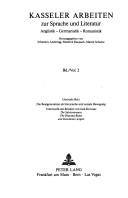
ISBN: 3261023104 Year: 1977 Volume: Bd. 2 Publisher: Frankfurt am Main Lang
Abstract | Keywords | Export | Availability | Bookmark
 Loading...
Loading...Choose an application
- Reference Manager
- EndNote
- RefWorks (Direct export to RefWorks)
Bohemianism --- Kerouac, Jack, --- Criticism and interpretation --- Beat generation --- Beatniks --- Persons --- Kerouac, John, --- Kérouac, Jean Louis Lebris de, --- Chia-lo-kʻo, Chieh-kʻo, --- Keruak, Dz︠h︡ek, --- Ḳeruʼaḳ, G'eḳ, --- קרואק, ג׳ק, --- Criticism and interpretation. --- Kerouac, Jack --- Kerouac, John --- Kérouac, Jean Louis Lebris de --- Chia-lo-kʻo, Chieh-kʻo --- Keruak, Dz︠h︡ek --- Ḳeruʼaḳ, G'eḳ
Book
ISBN: 0472072161 1306585171 0472120328 9780472120321 9781306585170 9780472072163 9780472052165 0472052160 Year: 2014 Publisher: Ann Arbor : The University of Michigan Press,
Abstract | Keywords | Export | Availability | Bookmark
 Loading...
Loading...Choose an application
- Reference Manager
- EndNote
- RefWorks (Direct export to RefWorks)
A new critical perspective on Kerouac's work and his textual practices.
Fiction --- Fiction writing --- Writing, Fiction --- Authorship --- Metafiction --- Authorship. --- Technique. --- Kerouac, Jack, --- Kerouac, Jack --- Kerouac, John --- Kérouac, Jean Louis Lebris de --- Chia-lo-kʻo, Chieh-kʻo --- Keruak, Dz︠h︡ek --- Ḳeruʼaḳ, G'eḳ --- קרואק, ג׳ק,
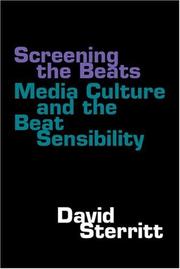
ISBN: 1429417803 9781429417808 0809325632 9780809325634 Year: 2004 Publisher: Carbondale : Southern Illinois University Press,
Abstract | Keywords | Export | Availability | Bookmark
 Loading...
Loading...Choose an application
- Reference Manager
- EndNote
- RefWorks (Direct export to RefWorks)
Beat literature --- Mass media and literature --- Mass media --- American Literature --- English --- Languages & Literatures --- Mass communication --- Media, Mass --- Media, The --- Communication --- Literature and mass media --- Literature --- History and criticism. --- History --- Film adaptations. --- Kerouac, Jack, --- Kerouac, Jack --- Kerouac, John --- Kérouac, Jean Louis Lebris de --- Chia-lo-kʻo, Chieh-kʻo --- Keruak, Dz︠h︡ek --- Ḳeruʼaḳ, G'eḳ --- קרואק, ג׳ק,
Book
ISBN: 1282776959 9786612776953 1443824763 9781443824767 9781443824163 144382416X 9781282776951 6612776951 Year: 2010 Publisher: Newcastle upon Tyne Cambridge Scholars Pub.
Abstract | Keywords | Export | Availability | Bookmark
 Loading...
Loading...Choose an application
- Reference Manager
- EndNote
- RefWorks (Direct export to RefWorks)
Kerouac Ascending: Memorabilia of the Decade of ON THE ROAD is a memoir written by Elbert Lenrow about his relationship with Jack Kerouac, whom he taught at the New School in NewYork when Jack was emerging as a writer and with Allen Ginsberg, both of whom Lenrow befriended and encouraged. Lenrow writes with sympathy and charm about both writers and their "beat" friends, revealing Kerouac's seriously academic side by sharing papers he wrote in his course and giving insight about both writers t...
Authors, American --- Beats (Persons) --- Beat generation --- Beatniks --- Persons --- Bohemianism --- Ginsberg, Allen, --- Kerouac, Jack, --- Lenrow, Elbert, --- Kerouac, Jack --- Kerouac, John --- Kérouac, Jean Louis Lebris de --- Chia-lo-kʻo, Chieh-kʻo --- Keruak, Dz︠h︡ek --- Ḳeruʼaḳ, G'eḳ --- קרואק, ג׳ק, --- Ginzberg, Alen, --- Gīnasabārga, Ayālena, --- Ginsberg, Irwin Allen, --- גינזברג, אלן --- Friends and associates.
Book
ISBN: 1441619461 0809387891 9781441619464 Year: 2008 Publisher: Carbondale Southern Illinois University Press
Abstract | Keywords | Export | Availability | Bookmark
 Loading...
Loading...Choose an application
- Reference Manager
- EndNote
- RefWorks (Direct export to RefWorks)
Beat generation in literature. --- Modernism (Literature) --- Literary form --- Beat generation in literature --- History --- Kerouac, Jack, --- Kerouac, Jack --- Kerouac, John --- Kérouac, Jean Louis Lebris de --- Chia-lo-kʻo, Chieh-kʻo --- Keruak, Dz︠h︡ek --- Ḳeruʼaḳ, G'eḳ --- קרואק, ג׳ק, --- Criticism and interpretation. --- Beats (Persons) in literature.
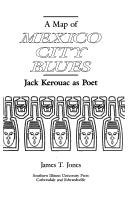
ISBN: 0809318288 9780809318285 0585187118 9780809385980 0809385988 9780585187112 9780809330065 0809330067 Year: 1992 Publisher: Carbondale, Ill. Southern Illinois University Press
Abstract | Keywords | Export | Availability | Bookmark
 Loading...
Loading...Choose an application
- Reference Manager
- EndNote
- RefWorks (Direct export to RefWorks)
In this pioneering critical study of Jack Kerouac's book-length poem, Mexico City Blues-a poetic parallel to the writer's fictional saga, the Duluoz Legend-James T. Jones uses a rich and flexible neoformalist approach to argue his case for the importance of Kerouac's rarely studied poem. After a brief summary of Kerouac's poetic career, Jones embarks on a thorough reading of Mexico City Blues from several different perspectives: he first focuses on Kerouac's use of autobiography in the poem and then discusses how Kerouac's various trips t
Kerouac, Jack, 1922-1969. Mexico City blues --- Mexico in literature --- Beat generation in literature. --- Kerouac, Jack, --- Kerouac, Jack. --- Poetic works. --- Mexico --- In literature. --- Kerouac, Jack --- Poetic works --- Baraka, Imamu Amiri --- Parker, Charles Christopher --- Kerouac, Jack, 1922-1969 -- Poetic works. --- Kerouac, Jack, 1922-1969. Mexico City blues. --- Mexico -- In literature. --- Kerouac, John --- Kérouac, Jean Louis Lebris de --- Chia-lo-kʻo, Chieh-kʻo --- Keruak, Dz︠h︡ek --- Ḳeruʼaḳ, G'eḳ --- קרואק, ג׳ק,
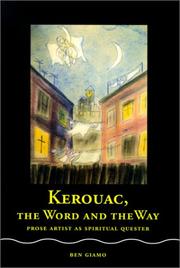
ISBN: 058546443X 9780585464435 0809323214 9780809323210 0809324318 9780809324316 Year: 2000 Publisher: Carbondale Southern Illinois University Press
Abstract | Keywords | Export | Availability | Bookmark
 Loading...
Loading...Choose an application
- Reference Manager
- EndNote
- RefWorks (Direct export to RefWorks)
"Giamo's main purpose is to chronicle and clarify Kerouac's various spiritual quests through close examinations of the novels. Kerouac began his quest with On the Road, which also is Giamo's real starting point. To establish early themes, spiritual struggles, and stylistic shifts, however, Giamo begins with the first novel, The Town and the City, and ends with Big Sur, the final turning point in Kernouac's quest." "Kerouac was primarily a religious writer bent on testing and celebrating the profane depths and transcendent heights of experience and reporting both truly. Baptized and buried a Catholic, he was also heavily influenced by Buddhism, especially from 1954 until 1957 when he integrated traditional Eastern belief into several novels. Catholicism remained an essential force in his writing, but his study of Buddhism was serious and not solely in the service of his literary art."--Jacket.
Autobiographical fiction, American --- Quests (Expeditions) in literature --- Beats (Persons) in literature --- Beat fiction, American --- Spiritual life in literature --- American Literature --- English --- Languages & Literatures --- Quests in literature --- American Beat fiction --- American fiction --- Beat generation in literature --- History and criticism --- History and criticism. --- Kerouac, Jack, --- Kerouac, Jack --- Kerouac, John --- Kérouac, Jean Louis Lebris de --- Chia-lo-kʻo, Chieh-kʻo --- Keruak, Dz︠h︡ek --- Ḳeruʼaḳ, G'eḳ --- קרואק, ג׳ק, --- Criticism and interpretation. --- Criticism and interpretation --- Autobiographical fiction [American ]
Book
ISBN: 0585321787 9780585321783 0872497984 Year: 1992 Publisher: Columbia : University of South Carolina Press,
Abstract | Keywords | Export | Availability | Bookmark
 Loading...
Loading...Choose an application
- Reference Manager
- EndNote
- RefWorks (Direct export to RefWorks)
Foster provides a survey of the four major Beat writers: Jack Kerouac, Allen Ginsberg, William S. Burroughs, and Gregory Corso. These writers were closely allied from the beginning of their careers and shared a particular vision of America, one which in turn defined much of their most celebrated work. They wrote in opposition to the materialistic, conformist culture they saw developing in postwar America, seeking through their fiction and poetry a way out of that world. Literature, as Foster demonstrates, allowed both writer and reader to see things as they were while, at the same time, providing an entry into transcendent realities. The best-known Beat works, On the Road, "Howl," and Naked Lunch, responded directly to social and political conditions at mid-century while indicating ways to escape them. Although the Beats were widely seen as social revolutionaries by journalists, Kerouac, Ginsberg, Burroughs, and Corso were always predominantly writers. As the United States moved away from the contained, conservative temperament of the postwar period, the Beats became celebrities, and, as such, were dependent for their reputations on newspapers, magazines, and television. Their fame assured that they would be read, yet they were perhaps better known for their values and their personalities than for their books. Confusing the writer with the subject of On the Road, Kerouac's early followers were surprised to find that he did not even like to drive. They failed to see that his real revolution had to do with language. Foster focuses on the problems of language and aesthetics that the Beats confronted and suggests to the reader the great range of influence their work has had on subsequent writers.
Beat literature --- Beats (Persons) --- American literature --- American Literature --- English --- Languages & Literatures --- Beat generation --- Beatniks --- Persons --- Bohemianism --- Literature --- History and criticism. --- History and criticism --- Kerouac, Jack, --- Burroughs, William S., --- Ginsberg, Allen, --- Ginzberg, Alen, --- Gīnasabārga, Ayālena, --- Ginsberg, Irwin Allen, --- גינזברג, אלן --- Burroughs, William S. --- Burroughs, William --- Lee, Willy --- Lee, William --- Baroouz, Ouiliam --- Berrouz, Uilʹi︠a︡m --- Kerouac, Jack --- Kerouac, John --- Kérouac, Jean Louis Lebris de --- Chia-lo-kʻo, Chieh-kʻo --- Keruak, Dz︠h︡ek --- Ḳeruʼaḳ, G'eḳ --- קרואק, ג׳ק, --- Criticism and interpretation. --- United States --- Intellectual life --- 20th century
Book
ISBN: 0070657238 9780070657236 Year: 1976 Publisher: New York (N.Y.): MacGraw-Hill
Abstract | Keywords | Export | Availability | Bookmark
 Loading...
Loading...Choose an application
- Reference Manager
- EndNote
- RefWorks (Direct export to RefWorks)
American literature --- Authors, American --- Beat generation --- Bohemianism --- History and criticism --- Biography --- Burroughs, William S., --- Ginsberg, Allen, --- Kerouac, Jack, --- -Authors, American --- -Beat generation --- -Manners and customs --- Hippies --- Beatniks --- Beats --- American authors --- English literature --- Agrarians (Group of writers) --- United States --- Burroughs, William S. --- Ginsberg, Allen --- Kerouac, Jack --- Beat generation. --- History and criticism. --- Biography. --- -History and criticism --- Persons --- Manners and customs --- -Beats (Persons) --- Ginsberg, Allen. --- Kerouac, John --- Kérouac, Jean Louis Lebris de --- Chia-lo-kʻo, Chieh-kʻo --- Keruak, Dz︠h︡ek --- Ḳeruʼaḳ, G'eḳ --- קרואק, ג׳ק, --- Burroughs, William --- Lee, Willy --- Lee, William --- Baroouz, Ouiliam --- Berrouz, Uilʹi︠a︡m --- -English literature --- -American authors --- American literature - 20th century - History and criticism --- Authors, American - 20th century - Biography --- Bohemianism - United States --- Burroughs, William S., - 1914-1997 --- Ginsberg, Allen, - 1926-1997 --- Kerouac, Jack, - 1922-1969
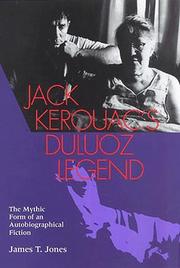
ISBN: 0585106800 9780585106809 0809322633 9780809322633 Year: 1999 Publisher: Carbondale : Southern Illinois University Press,
Abstract | Keywords | Export | Availability | Bookmark
 Loading...
Loading...Choose an application
- Reference Manager
- EndNote
- RefWorks (Direct export to RefWorks)
"In the only critical examination of all of Jack Kerouac's published prose, James T. Jones turns to Freud to show how the great Beat writer used the Oedipus myth to shape not only his individual works but also the entire body of his writing." "Like Balzac, Jones explains, Kerouac conceived an overall plan for his total writing corpus, which he called the Duluoz Legend after Jack Duluoz, his fictional alter ego. While Kerouac's work attracts biographical treatment - the ninth full-length biography was published in 1998 - Jones takes a Freudian approach to focus on the form of the work. Noting that even casual readers recognize family relationships as the basis for Kerouac's autobiographical prose, Jones discusses these relationships in terms of Freud's notion of the Oedipus complex."--BOOK JACKET.
Psychoanalysis and literature --- Autobiographical fiction, American --- Oedipus complex in literature. --- Duluoz (Fictitious character) --- Myth in literature. --- Self in literature. --- Beat literature --- American Literature --- English --- Languages & Literatures --- Literature and psychoanalysis --- Psychoanalytic literary criticism --- Literature --- History --- History and criticism. --- Kerouac, Jack, --- Oedipus --- Edip --- Edipas --- Edipi --- Edipo --- Edips --- Edipu --- Edipus --- Edyp --- Ødipus --- Oedip --- Œdipe --- Oidipus --- Oidipusz --- أوديب --- Эдип --- Эдып --- Едіп --- Едип --- Οἰδίπους --- Οιδιποδας --- 오이디푸스 --- オイディプース --- 俄狄浦斯 --- עדיפוס --- אדיפוס --- Kerouac, Jack --- Kerouac, John --- Kérouac, Jean Louis Lebris de --- Chia-lo-kʻo, Chieh-kʻo --- Keruak, Dz︠h︡ek --- Ḳeruʼaḳ, G'eḳ --- קרואק, ג׳ק, --- Criticism and interpretation. --- Characters --- Duluoz. --- In literature. --- Oedipus complex in literature --- Myth in literature --- Self in literature --- Beats (Persons) --- Psychanalyse et littérature --- Roman autobiographique américain --- Oedipe (Mythologie grecque) dans la littérature --- Complexe d'Oedipe dans la littérature --- Duluoz (Personnage fictif) --- Mythe dans la littérature --- Moi dans la littérature --- Beat generation --- History and criticism --- Histoire --- Histoire et critique --- Beat generation. --- Duluoz (Fictitious character). --- Oedipus (Greek mythology) in literature.
| Listing 1 - 10 of 10 |
Sort by
|

 Search
Search Feedback
Feedback About UniCat
About UniCat  Help
Help News
News